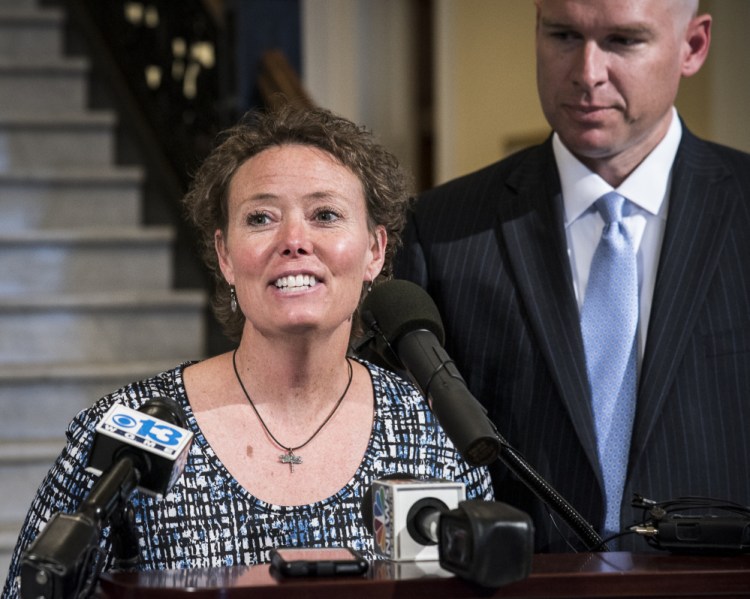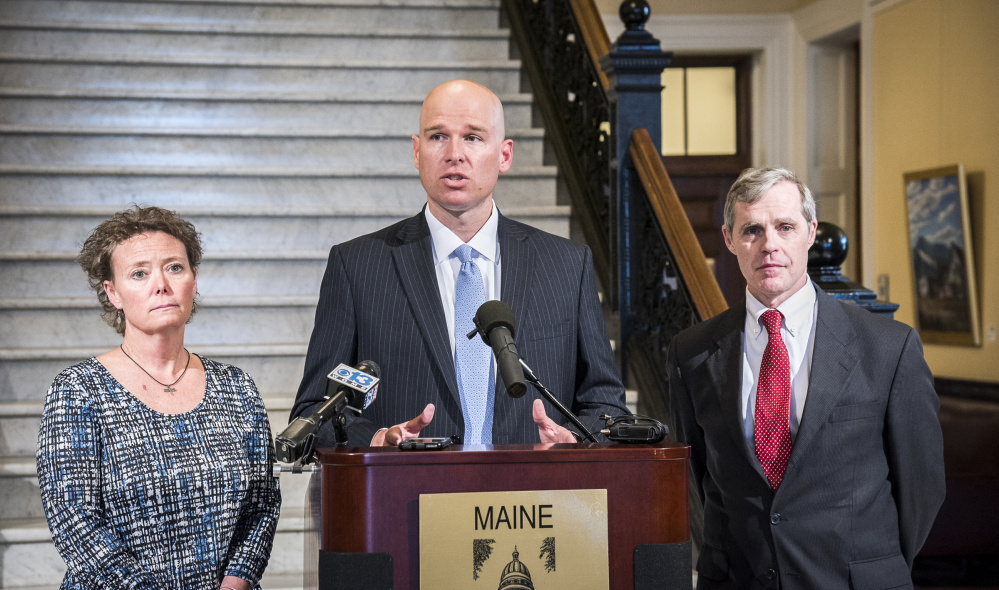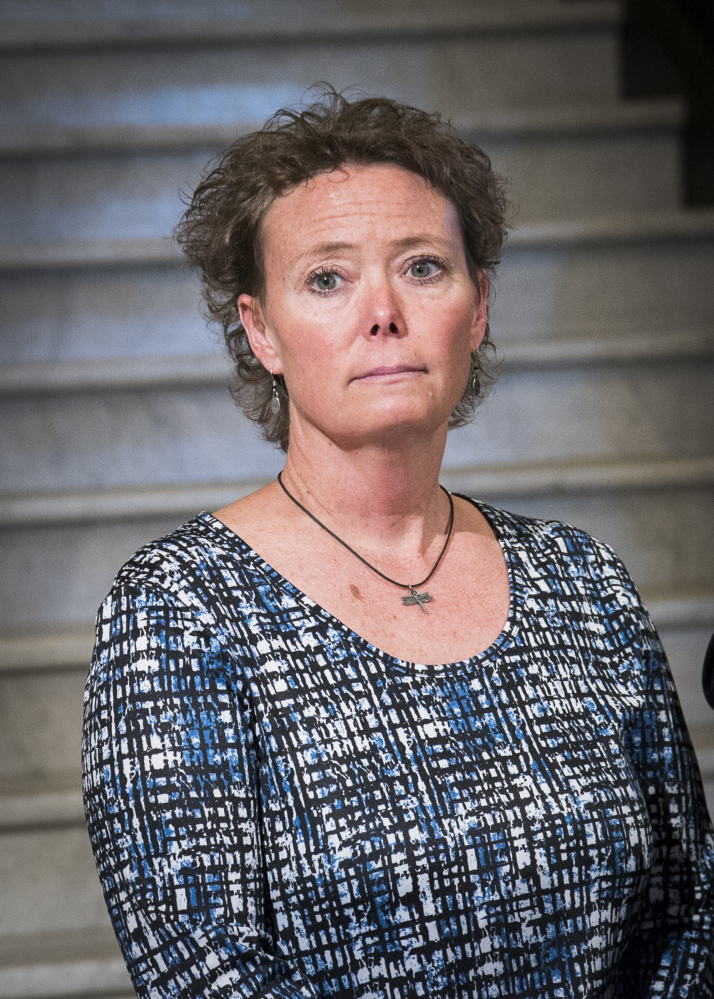AUGUSTA — An employee has filed a complaint of religious discrimination against the Augusta School Department, alleging that she was unfairly disciplined for telling a coworker that she would pray for him in September.
The employee, an educational technician named Toni Richardson, has filed her complaint with the Equal Employment Opportunity Commission, the federal agency that enforces civil rights cases involving work place discrimination. She announced her complaint at the State House on Tuesday afternoon, standing next to her attorneys.
“This entire year Toni has had to self censor herself, making sure she’s not using religious language,” said one of her attorneys, Jeremy Dys of the First Liberty Institute, a national organization that represents clients in similar cases. “This has been a hard year for Toni. She’s even had to refrain from wearing jewelry that has a cross on it, because if someone were to overhear this private conversation or see that religious imagery round her neck, then she could face discipline or even be terminated.”
As part of her complaint, Richardson is asking the school department to throw out a memorandum it sent to her and tell her fellow employees that they won’t face discipline for using religious language, Dys said.
But in a written statement, school officials said they had been working with Richardson to address her concerns and were surprised by the legal complaint that she filed this week.
“We are very surprised and extremely disappointed by the filing of this EEOC complaint for the simple reason that we had made a good faith proposal to Ms. Richardson’s lawyers to address her concerns and resolve this matter,” the statement read. “And while they had promised to get back to us (and we were waiting to hear from them), they have instead chosen to litigate without any response to our proposal.”
And a lawyer from another national organization that tries to keep religion out of public institutions said that groups like First Liberty Institute take up cases like Richardson’s to advance a narrative that Christianity is under attack.
Though it did not appear to be the case in the recent legal action against the Augusta School Department, those groups sometimes use their complaints to justify actions that discriminate against LGBT people and other populations, said Alex Luchenitser, associate legal director at Americans United for Separation of Church and State.
“There has been, in recent years, a growing number of cases where religious believers allege they’re being discriminated against by government bodies,” Luchenitser said.
Then referring to groups like First Liberty institute, he continued, “They try to paint a picture of Christians as being persecuted by government whenever they learn of incidents like the one being alleged, when in fact Christians are the majority group in America.”
In her complaint, Richardson, a special education technician at Cony High School, said she was disciplined by the school department after trying to offer words of encouragement to a co-worker, who also attends her church, by telling him she would pray for him. She said she was later “interrogated” by school officials, who sent her a “coaching memorandum” telling her what she can and cannot say in school.
While announcing her complaint Tuesday afternoon, her attorney handed out copies of that memorandum, in which a school official referred to Establishment Clause in the First Amendment, which prohibits public institutions from favoring certain religions.
“In the future, it is imperative you do not use phrases that integrate public and private belief systems when in public schools,” wrote the official, whose name was redacted from the copy of the memorandum. “This coaching memorandum is not considered disciplinary in nature and will not be included in your personnel file. If you have any additional interactions that are deemed unprofessional by administration, you will be subject to disciplinary action and/or possibly dismissal.”
Dys, the attorney from the First Liberty Institute, said Tuesday afternoon that, even though the official said the memo would not go in Richardson’s personnel file, the threat of possible dismissal suggested that it essentially was going in her file.
“All I’m asking for is for the memo to be taken away,” Richardson said during a brief remarks at the State House. “It makes me feel nervous and scared.”
Richardson provided more information in a written complaint, a copy of which is available on the First Liberty Institute website.
In a statement released Tuesday afternoon, the Augusta School Department said it “recognizes the rights of employees to hold and express religious beliefs and it never was our intent to unlawfully restrict those rights.”
The department said that it rewrote its memorandum to Richardson to “make this crystal clear” and gave a copy of the rewritten memorandum to her attorneys for them to review, but had not heard back from the legal team until learning of the complaint this week. It was not clear late Tuesday whether the rewritten version of the memorandum was the one her attorneys distributed at the State House.
“We remain strong believers that here in Maine important issues like this are best resolved through honest and open dialogue,” the school department wrote in its statement. “We believed this is exactly what was happening — and it is so disappointing that our commitment evidently was not shared. While we disagree with some of the allegations that have been made, now is not the time and place to get into a debate over those issues.”
The First Liberty Institute, based in Texas, is the largest legal organization in the country that works to protect religious freedom, according to its website. Richardson also has Maine attorneys, including Timothy Woodcock, who was at the announcement on Tuesday.
Zachary Heiden, legal director for the American Civil Liberties Union of Maine, was not aware of Richardson’s case until a reporter contacted the organization Tuesday.
Without addressing the specifics of the case, Heiden said that the Free Exercise Clause in the First Amendment allows students and teachers to practice their religion, whether by wearing a crucifix or writing an essay with religious themes.
He said there are also some groups that have challenged laws like the Affordable Care Act under the Free Exercise clause, stating that it violates their religious beliefs.
The ACLU has defended clients on Free Exercise grounds, Heiden said, but it has opposed laws that use the principle to infringe on the rights of LGBT people, like the so-called religious freedom bill that was proposed in the Maine Legislature in 2015. That year, similar laws that were passed in Arkansas and Indiana led to protests and a national backlash.
Charles Eichacker — 621-5642
Twitter: @ceichacker
Copy the Story LinkSend questions/comments to the editors.







Success. Please wait for the page to reload. If the page does not reload within 5 seconds, please refresh the page.
Enter your email and password to access comments.
Hi, to comment on stories you must . This profile is in addition to your subscription and website login.
Already have a commenting profile? .
Invalid username/password.
Please check your email to confirm and complete your registration.
Only subscribers are eligible to post comments. Please subscribe or login first for digital access. Here’s why.
Use the form below to reset your password. When you've submitted your account email, we will send an email with a reset code.